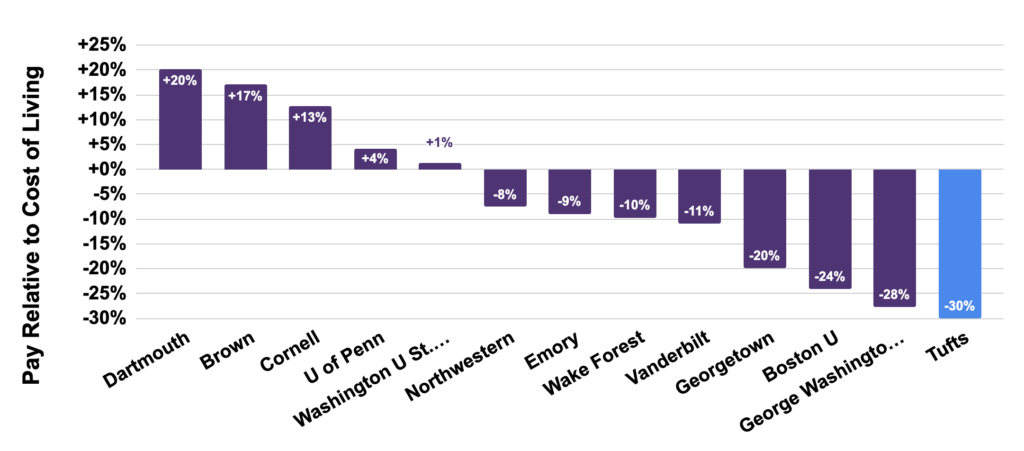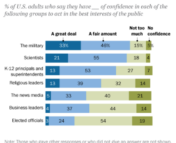This post was written and motivated based on the personal experience of the listed author. The opinions expressed by the author are not necessarily representative of the views of the American Astronomical Society or other institutions with whom our authors are affiliated.
The author, Lucas Brown, is a first-year master’s student at Tufts University in the Department of Physics and Astronomy. He is not a member of the Tufts University Graduate Workers Union, as membership is restricted to PhD students only.
You can sign a petition endorsing the Union’s contract proposal here.
On Monday, April 10th, a sea of graduate student workers began to eagerly fill up the Alumnae Lounge in Tufts University’s Aidekman Arts Center, passing out purple bandanas from Service Employees International Union (SEIU) Local 509 adorned with a pattern of yellow raised fists, the SEIU logo, and highlighted text reading “STRONG CONTRACT STRONG COMMUNITIES”. The bandanas, along with the purple shirts, hats, sweaters, and other accessories worn by workers throughout the crowd, created a sense of solidarity and togetherness that clearly signaled this year’s contract re-negotiation was not going to be taken lightly—everyone had something at stake in the process that what was about to commence.
Six years prior, Tufts University graduate workers in the Graduate School of Arts and Sciences voted to unionize with SEIU Local 509, forming one of the very first graduate worker unions at a private university in the country. Established amidst an era of increasingly hostile political conditions for unions and after more than a decade of organizing, the Tufts University Graduate Workers Union (TUGWU), along with their counterparts at Brandeis University and New York University were able to not only negotiate higher wages and working conditions of hundreds of graduate workers at their home institutions, but also helped set precedent for a wave of unionization efforts across the greater Boston area and the country at large that followed. Now, as the initial five-year contract between TUGWU and Tufts University draws to a close, the graduate workers who comprise the Union are faced with the task of negotiating a new contract that provides just and fair working conditions for a “post-pandemic” world.
High Tuition, Low Working Conditions
Tufts provides one of the most prestigious—and expensive—undergraduate educations in the nation. Yearly tuition easily surpasses $60,000 for many of its 6,500 undergraduates, and its endowment has grown to nearly 2.5 billion dollars in recent years, up around 20% since the beginning of the COVID-19 pandemic alone. Despite this, its graduate assistants receive some of the lowest stipends within the greater Boston area, and when adjusted against cost of living, Tufts graduate assistant stipends are among the lowest for the top-50 ranked U.S. universities, sitting between $25,632 and $28,637 depending on department and position. For reference, according to the Massachusetts Institute of Technology Living Wage Calculator, a single working adult with no dependents has an expected yearly cost of living of $48,779 in the Medford/Somerville area where Tufts is located—nearly twice as much as the current stipend provides. As a result, TUGWU’s opening proposal, presented for the first time at April 10th’s bargaining session, is to increase the baseline stipend for union employees to $55,000 for the 2023-2024 school year, with guaranteed increases on top of this over the next few years.

During the first bargaining session, workers provided the administration with anecdotes which underlined the impact that this mismatch between wages and cost of living had on their day-to-day lives. Among these anecdotes, some common themes emerged. Many workers had to move out of the Boston area entirely for all of or part of the year to afford rent, causing long commutes to be commonplace, effectively extending many graduate assistants’ workdays. International students, who are often not able to pick up second jobs, sometimes went years without seeing their family abroad due to prohibitive costs. Some in the audience recounted the pain of regularly having to stay up late into the night to try and work out their finances, or search for cheaper housing, only to wake up to teach 8:00a.m. labs the next morning.
On top of the low monetary compensation Tufts graduate workers receiver, their health care plans currently do not cover vision and dental. Not only is it clear that both of these things are integral to a person’s overall health and should be covered on that basis alone, it is especially harmful to leave graduate workers uninsured in these areas, as their aforementioned low stipends make it practically impossible to afford dental or vision healthcare out-of-pocket. How is a teaching assistant supposed to do a good job if they cannot pay for their prescription glasses? How is a research assistant supposed to generate high-quality research while managing a painful cavity?
Working conditions beyond just compensation are also oftentimes inadequate—many of the Union’s proposed changes to their contract involve creating a higher standard for setting and communicating particular department-specific work policies. For example, the Union is asking for stronger language to be put in the contract to protect workers’ rights to take time off for University holidays; many in the audience during bargaining recounted issues of supervisors pressuring them to conduct research on holidays or breaks. Other provisions included requiring each department to provide handbooks to their graduate assistants explicitly outlining whatever policies and procedures affect their work.
All of the aforementioned issues regarding compensation and working conditions are often even worse for members of marginalized communities. For example, members of marginalized communities tend to have less access to familial wealth. Expounding this issue, some marginalized communities face unique healthcare expenses, many of which are not covered under workers’ current healthcare plans. In particular, gender-affirming care, which has been shown in study after study to be effective and often life-saving, is not covered. The Union, in an attempt to remedy this, is proposing the University be required to provide health insurance which covers gender-affirming care, PrEP for HIV prevention, along with vision and dental.
The University’s Response
Nearly five weeks after the initial bargaining meeting, TUGWU and the Tufts University bargaining team met for a second time in order to hear the University’s first official counter-proposal. Rather than being held in person, a decision was made to host this session over Zoom in order to allow workers who had to move out of town to still attend bargaining. Unlike in the first bargaining meeting, where solidarity was shown through visceral acts like over 100 people chanting “WHO RUNS TUFTS? WE RUN TUFTS”, the telltale sign of high attendance and enthusiasm at this meeting was the constant stream of Zoom door-bell sound effects which went off each time one of the nearly 150 participants joined the call. After the all-too-familiar struggle of getting everyone’s Zoom sharing permissions set up properly, Tufts’ bargaining team was ready to present their offer. So what did they think about TUGWU’s vision for a fair and just contract?
Perhaps unsurprisingly to those familiar with graduate student union negotiations, Tufts’ opening offer was met with disappointment from much of the Union membership. Some expressed shock, with the initial counter-proposal being even weaker than their worst expectations. Tufts was suggesting a raise in the base pay to $27,178 for non-STEM departments and $28,280 for STEM-departments—a far cry from TUGWU’s $55,000. Their proposal included yearly increases which resulted in a maximum pay of $32,774 for workers by 2028 — still well below the current cost of living, let alone the possible cost of living five years in the future. For some departments, like the Department of Physics and Astronomy, the proposed increases for 2023-2024 amounted to around a 2% absolute raise, which some in the Union noted would effectively reduce the pay of workers in that department when adjusted against large cost of living increases. The administration argued that these numbers were arrived at by extrapolating from the current contract’s rates, meaning they refused to even engage with the arguments brought forth by workers at the first bargaining session which centered around the need for a radical break from the status-quo.
Entire sections describing the requirement to provide LGBTQIA+ healthcare were struck from the University’s proposed contract, citing the high cost burden of such a change (when questioned on the specifics of these costs, they did not provide estimates). When pressed on why Tufts would publicly announce support for their LGBTQIA+ community while ignoring substantive policy changes like providing gender-affirming care, the University’s bargaining team again deferred to vague concerns over costs, essentially saying that Tufts couldn’t be “all things to all people”. Dental and vision coverage we put “on hold” awaiting further discussions also around cost. One union member raised points about Tufts’ million dollar expenditures on emeritus salaries, which was met with accusations that the member was employing “ad hominem” arguments. Some of the proposals Tufts did agree to included mandating the production of handbooks, but their language weakened the requirements of what was to be included in them and how promptly they had to be provided. “Insulting” was a common descriptor of the University’s proposed contract in ensuing discussions amongst union members.
Who Runs Tufts? We Run Tufts
The working conditions of graduate assistants directly impact the learning outcomes of Tufts undergraduates as well as the quality of research conducted at Tufts. Given the University’s pride in its status as an R1 research institution and its notably high undergraduate tuition, it is not hard to see how graduate workers generate immense value to the institution. Without graduate workers, a large portion of Tufts’ research output would be impossible, and there would be practically no way to conduct recitation sessions, laboratory courses, or other activities which provide undergraduates one-on-one learning support.
In the coming months, TUGWU and the University administration will continue to meet, with the hope that both sides will eventually come to an amicable agreement. Given the current gap between the proposals, however, achieving a contract that accurately reflects the dignity and value of Tufts graduate workers is likely to require a great deal of effort. While much of that effort will come from graduate workers themselves convincing the administration of the power and value of their labor, the support and solidarity of the general public is valuable as well. If you’re interested in lending your support to the cause of providing Tufts University graduate workers with a fair and just contract, you can find their petition to endorse their proposed contract here.
Further Reading:
Op-ed: Tufts graduate workers need a just contract
Context on Tufts’ original unionization effort
Tufts pays $2 million for new MBTA station naming rights (while the Green Line extension continues to raise rents in Somerville)
These college presidents in Massachusetts were paid more than a million dollars annually
Article edited by Lucie Rowland and Jenny Calahan.
Featured image credit: SEIU Local 509 via Twitter





Let us know when you set up a strike fund.